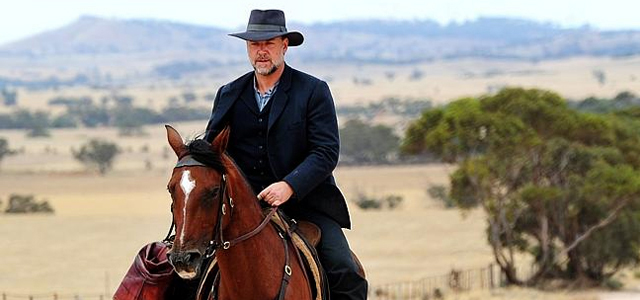(M) Starring: Russell Crowe, Olga Kurylenko, Yilmaz Erdogan, Jai Courtney
This year marks the centenary of World War One’s Gallipoli campaign which, for many, is a formative moment in our national history. It marked the first time that Australians fought as ANZACs, rather than as part of the British military. Such a significant milestone makes it no surprise that we are seeing Gallipoli events returning to our screens, such as Russell Crowe’s directorial debut, The Water Diviner.
In 1919, Australian farmer Joshua Connor (played by Crowe) travels to Gallipoli to recover the bodies of his three sons, who never returned from the campaign. All three were lost on the same day — 7 August, 1915. But after recovering two of their bodies, he learns one of his boys was taken prisoner by Turkish soldiers. With the help of Major Hasan (Yilmaz Erdogan) of the Turkish army, he attempts to trace the whereabouts of his remaining son.
The Great War marked the first time that attempts were made to recover and identify the bodies of fallen soldiers. The Water Diviner’s story was inspired by a single line in a letter from a Colonel (in the Imperial War Graves Unit), who noted how an Australian man came to Gallipoli, searching for his sons’ graves. However, from that starting point, Crowe’s film takes some obvious dramatic license in telling this ‘true story.’ The title is a reference to Joshua’s ability to locate the groundwater needed to run his farm, in the punishing climate of the outback. Joshua divining water is one thing, but watching him use this same method to locate where his sons’ bodies are buried on the battlefield, is quite a leap for viewers to take.
The Gallipoli campaign received its definitive cinematic treatment in 1981 with Peter Weir’s Gallipoli. But with The Water Diviner, Crowe manages to bring a new perspective to this much mythologised moment in Australia’s history. The Water Diviner offers a far greater focus on the Turkish experience of the battle than has previously been offered to Australian audiences. This engaging of a different perspective starts as simply as acknowledging that the Turks don’t even call the site Gallipoli. Major Hasan reminds us that while 10,000 ANZACs fell there, 70,000 Turks lost their lives. On top of this, even in 1919, the war was not yet over for the Turks. As the rest of the world breathed a sigh of relief, the Turks were fiercely defending their territory as the Greeks carved away at the Ottoman Empire. As The Water Diviner shows the uneasy cooperation between Allied and Turkish military in the aftermath of the war, we see both sides coming to terms with what has occurred. As conceded by one of the central characters: “I don’t know if I forgive any of us.”
Alongside this exploration of Turkey in the aftermath of the war, is an entirely unnecessary romantic subplot involving Joshua making eyes at Ayshe (Olga Kurylenko), who runs the Istanbul hotel he is staying at. She is also grieving her husband’s death in the war, a fact she has not yet confessed to her son. This rather trite romantic subplot is nowhere near as interesting or engaging as the rest of the film. The result is an uncomfortable clashing of tones, with the main story being quite sombre and serious, while the romance is, at times, light and whimsical.
As a directorial debut from Oscar winner Crowe, The Water Diviner will not blow you away. But it represents the sort of competent handling of the material you would expect from a man who has been an active collaborator, for much of his 25 years as an actor. While some of its narrative elements are a bit naff, The Water Diviner’s invitation to consider the sacrifices made on both sides of this conflict, makes it a notable contribution to the ever-expanding exploration of the Gallipoli campaign.
Duncan McLean













